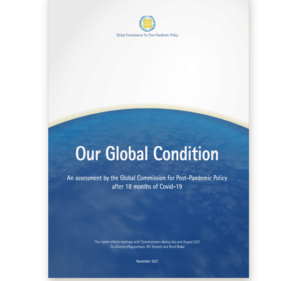 After 18 months of Covid-19, incoherent, slow-moving responses to high mortality rates have called into question the legitimacy of governing institutions in many countries, notably but not solely democracies, according to a recent report.
After 18 months of Covid-19, incoherent, slow-moving responses to high mortality rates have called into question the legitimacy of governing institutions in many countries, notably but not solely democracies, according to a recent report.
As the crisis and associated mistakes have been shared across borders amid great scientific and social-scientific uncertainties, poor responses to the pandemic have not produced clear or consistent political consequences. But in those countries where expectations were unmet and doubts engendered, damage has been done to long-term popular support for or belief in political processes and institutions, national and international, making them more vulnerable to future shocks, disorder and alienation. Institutions, already weak, have been further weakened, say the authors of Our Global Condition, an assessment by the Global Commission for Post-Pandemic Policy:
The long-term impact of this is unpredictable; but it is clear that major efforts to rebuild the
conditions for societal trust and public faith in political processes and institutions is essential
to make them and democracy itself more resilient to future shocks and to reduce the danger
of an institutional collapse itself generating new, broader crises with wide ramifications….. The currently planned half-decade (and hoped-for decade) of renewed public investment in advanced economies provides the chance for a reshaping of the role of the State in pluralist market democracies, for accelerating the transition from fossil fuels and for reducing the inequality of incomes and security that erodes solidarity, trust and legitimacy.

Credit: GCPPP
The social, political, and economic stresses introduced by a pandemic foster attitudes and behaviors that undermine social solidarity, notes former Economist editor Bill Emmott, a co-director/rapporteur of the Commission, with Berel Rodal. In countries and political systems where trust in institutions and the authority of expertise has been undermined by the legacy of the 2008 financial crisis and the growth of social media, coping with new crises remains an uphill struggle, he writes for Project Syndicate:
…. the trust and legitimacy crisis in the West needs to be taken more seriously. Western democracies’ increased vulnerability to extremist politics poses a danger not only to those countries but also to global stability and security. Here, the most urgent tasks are to update democratic rules and institutions for the twenty-first century; regulate social media to make those platforms more responsible; rekindle citizenship through new forms of participation; and expand investments to ensure greater equality of treatment and opportunity.
 An important pre-condition for democratic resilience is the state’s ability to respond to citizens’ needs, according to a report from the Club de Madrid – Democracy and Emergencies: Lessons from the COVID-19 pandemic for democratic resilience. Learning from a pandemic that has affected the health and economic well-being of so many citizens, governments must renew their commitment to inclusive social development, it contends, offering twenty recommendations for government leaders, public institutions and civil society.
An important pre-condition for democratic resilience is the state’s ability to respond to citizens’ needs, according to a report from the Club de Madrid – Democracy and Emergencies: Lessons from the COVID-19 pandemic for democratic resilience. Learning from a pandemic that has affected the health and economic well-being of so many citizens, governments must renew their commitment to inclusive social development, it contends, offering twenty recommendations for government leaders, public institutions and civil society.
The dangerous effects of ‘fake news’, the currency of misinformation and conspiracy, of truth decay, make effective communication essential for effective governance, and call for serious thought and action regarding education, adds the report of the Global Commission, an independent, global, inter-disciplinary, non-partisan group of policy-makers, scholars, scientists, strategists and others:
In more immediate and policy terms, this indicates the pressing need for strengthened regulation and other adaptive measures to treat extreme levels of concentration of ownership of media and social media platforms and to give those platforms greater legal responsibility for the content they distribute. Such concentration amid limited responsibility presents severe problems for building trust, exacerbates power imbalances and erodes the basis – an informed citizenry – on which democratic or broad public-interest values are fostered. RTWT

Amid critical challenges to democracy over the course of the COVID-19 pandemic, the recent Summit for Democracy highlighted key strategies with which stakeholders can bolster democratic resilience, notes Pandemic Ploys, a newsletter from the National Endowment for Democracy’s International Forum:
- Many low-income countries lack the capacity to distribute donated vaccine doses, creating another obstacle in the effort to rapidly and equitably allocate vaccines around the world.
- Recent reports by CEPA and CSIS ChinaPower analyze Beijing’s effort to improve perceptions of China and dispel criticism of the country’s response to the pandemic.
Fascinating and important study on role of trust in COVID-19 performance in seven democracies https://t.co/rQToSu8OLE
— Global Commission for Post-Pandemic Policy (GCPPP) (@GCPPPorg) September 11, 2021







